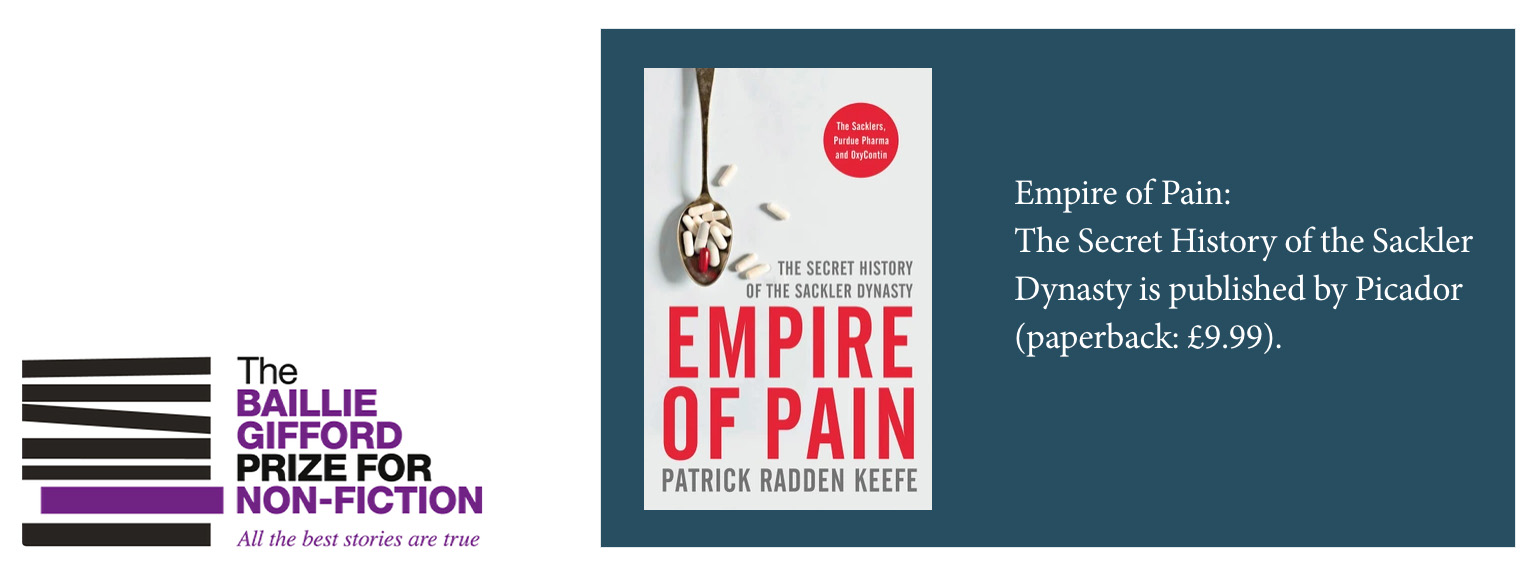
Photography by Fran Monks
Please remember that the value of an investment can fall and you may not get back the amount invested. This article originally featured in Baillie Gifford’s Spring 2022 issue of Trust magazine.
During his gap year, Patrick Radden Keefe sold tickets at a theatre on Harvard Square in Cambridge, Massachusetts, a stone’s throw from Harvard University’s Arthur M. Sackler Museum. Later, attending Columbia University in New York, he would visit the Sackler Wing at the Metropolitan Museum of Art (the name was dropped in December 2021). To him, the Sackler brand was in with the bricks of these elite institutions, and he gave it no further thought.
Then the New Yorker staff writer started reading about the US’s opioid crisis, blamed for more deaths than all American combat fatalities since the second world war. The penny dropped on learning about the role played by Purdue Pharma in developing the painkiller OxyContin. “I realised that the Sacklers own this company and said, ‘Wait a second, it’s those Sacklers?’”
When I meet him in a cafe near London’s Marylebone Station in early December 2021, Keefe, who won the Baillie Gifford Prize for Non-Fiction the previous month, is on his way to another book award ceremony at the National Gallery. “Three rooms down from the Sackler room,” he notes. The family’s extensive financial patronage of UK arts and academic institutions is now under scrutiny. Some beneficiaries, such as Serpentine Galleries and Tate Modern, have already chosen to remove the Sackler name.
Keefe’s investigation into the dynasty, whose vast fortune mushroomed through the development and aggressive marketing of OxyContin, has been widely acclaimed. The family, it’s safe to surmise, will not be happy about that.



Their reputation lies in tatters, with arts and academic institutions cutting ties
The first third of the book focuses on Arthur, Mortimer and Raymond Sackler, three brothers who trained as doctors in New York. The eldest, Arthur, built the family’s first fortune. He left medicine to work in pharmaceuticals advertising, revolutionising the field and creating a world in which OxyContin and other drugs could later be aggressively promoted to doctors.
Arthur’s tactics included the placement of large advertisements in medical journals and newspapers to raise awareness of the benefits of certain drugs and their target patients. Others included the direct courting of medical opinion leaders and regulators, while armies of Purdue sales reps separately wined and dined family doctors, offering them branded freebies in the name of ‘medical education’.
I put it to Keefe that doctors bear some responsibility for the opioid epidemic. They were the ones writing the prescriptions and witnessing the consequences first-hand. “Doctors were absolutely complicit. In some instances, they were guilty of criminal misconduct: they would set up ‘pill mills’ and take money to issue prescriptions,” Keefe says.
However, he believes that naivety played its part. “A lot of doctors just didn’t know much about the treatment of pain, didn’t know much about opioids. Then you had this army of sales representatives who came along and said: ‘You have patients who are in pain, it’s terrible … and here we have this amazing wonder drug that’s not addictive, and it will deliver them from pain.’ Many were too quick to listen to that siren song.”
We discuss the disconnect between the ‘do no harm’ mantra that the Sacklers had learned at medical school and their apparent indifference to the suffering their products unleashed. Court documents make clear that Purdue Pharma was aware of the addiction problem from early on.
The book is scathing about the family culture permeating the business. “Somebody I interviewed said that a Purdue Pharma board meeting was like a particularly acrimonious Thanksgiving dinner.”
In part, this is what fascinated Keefe about the Sackler story. “It isn’t this impersonal kind of mega-corporation. It is actually this small and centrally controlled expression of the family that owns it.”
As for the Sacklers, although their reputation lies in tatters, with arts and academic institutions cutting ties, the family remains fantastically wealthy. Keefe tells me about a reader who said how much they were looking forward to reaching the climax of the book where the Sacklers get their comeuppance. That moment never comes. But as one lawyer quoted near the end of Keefe’s book reflects, despite all the Sacklers’ money, “they can’t buy their reputations back”.

Important information
Baillie Gifford & Co and Baillie Gifford & Co Limited are authorised and regulated by the Financial Conduct Authority (FCA). Baillie Gifford & Co Limited is an Authorised Corporate Director of OEICs.
Baillie Gifford Overseas Limited provides investment management and advisory services to non-UK Professional/Institutional clients only. Baillie Gifford Overseas Limited is wholly owned by Baillie Gifford & Co. Baillie Gifford & Co and Baillie Gifford Overseas Limited are authorised and regulated by the FCA in the UK.
Persons resident or domiciled outside the UK should consult with their professional advisers as to whether they require any governmental or other consents in order to enable them to invest, and with their tax advisers for advice relevant to their own particular circumstances.
Financial intermediaries
This communication is suitable for use of financial intermediaries. Financial intermediaries are solely responsible for any further distribution and Baillie Gifford takes no responsibility for the reliance on this document by any other person who did not receive this document directly from Baillie Gifford.
Europe
Baillie Gifford Investment Management (Europe) Ltd (BGE) is authorised by the Central Bank of Ireland as an AIFM under the AIFM Regulations and as a UCITS management company under the UCITS Regulation. BGE also has regulatory permissions to perform Individual Portfolio Management activities. BGE provides investment management and advisory services to European (excluding UK) segregated clients. BGE has been appointed as UCITS management company to the following UCITS umbrella company; Baillie Gifford Worldwide Funds plc. BGE is a wholly owned subsidiary of Baillie Gifford Overseas Limited, which is wholly owned by Baillie Gifford & Co. Baillie Gifford Overseas Limited and Baillie Gifford & Co are authorised and regulated in the UK by the Financial Conduct Authority.
South Korea
Baillie Gifford Overseas Limited is licensed with the Financial Services Commission in South Korea as a cross border Discretionary Investment Manager and Non-discretionary Investment Adviser.
Japan
Mitsubishi UFJ Baillie Gifford Asset Management Limited (‘MUBGAM’) is a joint venture company between Mitsubishi UFJ Trust & Banking Corporation and Baillie Gifford Overseas Limited. MUBGAM is authorised and regulated by the Financial Conduct Authority.
Australia
Baillie Gifford Overseas Limited (ARBN 118 567 178) is registered as a foreign company under the Corporations Act 2001 (Cth) and holds Foreign Australian Financial Services Licence No 528911. This material is provided to you on the basis that you are a “wholesale client” within the meaning of section 761G of the Corporations Act 2001 (Cth) (“Corporations Act”). Please advise Baillie Gifford Overseas Limited immediately if you are not a wholesale client. In no circumstances may this material be made available to a “retail client” within the meaning of section 761G of the Corporations Act.
This material contains general information only. It does not take into account any person’s objectives, financial situation or needs.
South Africa
Baillie Gifford Overseas Limited is registered as a Foreign Financial Services Provider with the Financial Sector Conduct Authority in South Africa.
North America
Baillie Gifford International LLC is wholly owned by Baillie Gifford Overseas Limited; it was formed in Delaware in 2005 and is registered with the SEC. It is the legal entity through which Baillie Gifford Overseas Limited provides client service and marketing functions in North America. Baillie Gifford Overseas Limited is registered with the SEC in the United States of America.
The Manager is not resident in Canada, its head office and principal place of business is in Edinburgh, Scotland. Baillie Gifford Overseas Limited is regulated in Canada as a portfolio manager and exempt market dealer with the Ontario Securities Commission (‘OSC’). Its portfolio manager licence is currently passported into Alberta, Quebec, Saskatchewan, Manitoba and Newfoundland & Labrador whereas the exempt market dealer licence is passported across all Canadian provinces and territories. Baillie Gifford International LLC is regulated by the OSC as an exempt market and its licence is passported across all Canadian provinces and territories. Baillie Gifford Investment Management (Europe) Limited (‘BGE’) relies on the International Investment Fund Manager Exemption in the provinces of Ontario and Quebec.
Israel
Baillie Gifford Overseas Limited is not licensed under Israel’s Regulation of Investment Advising, Investment Marketing and Portfolio Management Law, 5755–1995 (the Advice Law) and does not carry insurance pursuant to the Advice Law. This material is only intended for those categories of Israeli residents who are qualified clients listed on the First Addendum to the Advice Law.
20312 10009691




